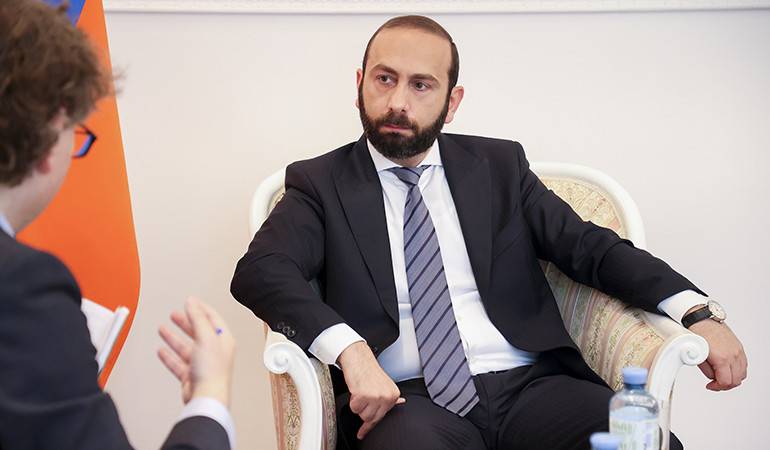The interview of Minister of Foreign Affairs of Armenia Ararat Mirzoyan to the Austrian daily “DerStandard”
21 July, 2023Within the framework of his working visit to Austria, Minister of Foreign Affairs of the Republic of Armenia Ararat Mirzoyan gave an interview to a leading Austrian daily "DerStandard". Questions of the journalist and the answers to them are presented below.
Question: Another round of peace negotiations between Armenia and Azerbaijan was held in Brussels on Saturday. What is the most important point for you in the negotiations?
Answer: Armenia and Azerbaijan cannot normalize their relations without taking into account the security and rights of the Armenian population of Nagorno-Karabakh. Azerbaijan has always talked about territorial claims from Armenia. However, the problem for us is the security and basic rights of the people.
Question։ Recently, we saw the news about the blockade of the Lachin corridor, an important transport hub leading to Nagorno-Karabakh. What is the current situation there?
Answer: The Lachin corridor is the only lifeline connecting Nagorno-Karabakh with Armenia and the outer world. It was illegally closed seven months ago in violation of the trilateral statement of November 2020. At the initial stage, the International Committee of the Red Cross and the Russian peacekeeping contingent were able to supply at least some amount of food and medicine to Nagorno-Karabakh. However, the corridor has already been completely blocked for a month. Nothing passes: Nagorno-Karabakh is under factual siege.
Question: Do you see a way out?
Answer: The humanitarian situation is dire, we are close to a humanitarian catastrophe. Therefore, we urgently need clear international support.
Question: Many international actors want to mediate: the EU, the USA, as well as Russia. However, everyone pursues their own interests. Do you always perceive it as support or sometimes feel pressure?
Answer: The process has two dimensions: political, which you are now asking about, and humanitarian. I would highlight these two aspects. First of all, we need immediate humanitarian intervention to save 120,000 people from starvation. Then we can continue negotiations with everyone who is interested in establishing lasting peace in the region.
Question: What is the precondition for lasting peace?
Answer: It is important that we do not fall into another dangerous cycle of hostility. Enough blood has already been shed in the South Caucasus. Mutual recognition of territorial integrity will be of key importance. As for the issue of the security and rights of the Armenians of Nagorno-Karabakh, we think that the best mechanism for this will be a dialogue with international participation.
Question: After the 2020 ceasefire signed by mediation of Russia, Prime Minister Nikol Pashinyan found himself under intense pressure: many perceived the ceasefire as “capitulation”, sometimes violent protests took place. What are the sentiments in Armenia today?
Answer: Yes, there was a serious crisis at that time. There were also extremist forces among the organizers. Governmental buildings were also attacked. I was attacked myself, I was the president of the Parliament then. We decided to appeal to the people. That’s how democracy works. The main election issues were Pashinyan’s peace agenda and whether Armenia should continue its democratic reforms. Despite all the difficulties, the ruling party won free and fair elections. Of course, even today there is criticism of the authorities, which is healthy. But the crisis of that time was overcomed.
Question: To what extent have Armenia's relations with Russia changed since then? After all, your country is a member of the Moscow-led Collective Security Treaty Organization (CSTO).
Answer: If we follow the existing discussions in the Armenian society, we can see great disappointment regarding the actions of the peacekeepers in Nagorno-Karabakh and the reaction of the Russian side to Azerbaijan's invasion of Armenia. We appealed to the CSTO and received an observation mission led by the Secretary General. But we expected more. It is not a secret.


